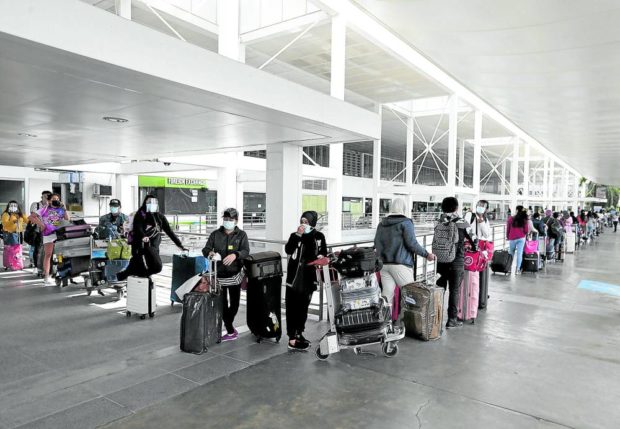OFW interest in bonds growing amid pandemic

HOME AGAIN In this photo taken in December 2020, overseas Filipino workers arrive at Ninoy Aquino International Airport as they prepare to rejoin their families in the provinces for the Christmas holidays. —RICHARD A. REYES
BAGUIO CITY, Benguet, Philippines — Interest in short-term government bonds among migrant Filipinos has grown during the pandemic, particularly for overseas workers who want to help revive the economy, National Treasurer Rosalia de Leon said here on Tuesday during the roadshow for the 26th tranche of the country’s retail treasury bonds (RTBs).
De Leon said this assumption was based on the response to RTB promotions from Filipinos living or working in at least 50 countries, indicating that “appetite” for short-term investments in government securities had increased.
In October, at least 200,000 of the 800,000 who secured RTBs were individuals from overseas, said Mark Hong, officer in charge of the treasury’s capital markets strategy and planning division.
To date, no studies or surveys had been launched to measure the reception of overseas Filipino workers (OFWs) to retail bonds, De Leon said.
But routine interactions with that sector revealed a “genuine desire to contribute to the country’s recovery,” she said.
Article continues after this advertisementEarning
In many instances, RTBs are additional forms of investments for OFWs on top of their monthly or quarterly remittances to their families who establish small businesses on their behalf, De Leon said.
Article continues after this advertisementInstead of letting money languish in time deposits overseas, some OFWs have embraced the novelty of government securities so they earn while the government uses their money to finance government programs, she said.
The RTB, like most government securities, are private individual or corporate funds which the government borrows for a limited period. Once these bonds mature, the government returns the money and its equivalent interest to bond owners.
Unlike conventional treasury bonds, which mature in about 30 years, RTBs have a five-year maturation period (or will mature in 2027 if issued this year) with each bond priced as low as P5,000. Each bond has a fixed annual interest rate of 4.6 percent.
The government is raising money to address spending deficits this year and in 2022 because of the huge cost of vaccinating the whole population and the release of social grants and aid for sectors who lost their jobs because of community quarantine restrictions to stop the spread of COVID-19, De Leon said.
Bank accounts
The country has reopened the economy and would need resources to keep businesses and industries steady, she added, given a third quarter growth of 7.1 percent.
Hong said one of the biggest concerns relayed by OFWs was that they do not have active Philippine bank accounts which discourages them from transacting in new forms of financial investments.
But the shift to a digital economy due to the quarantines helped develop new official online channels for transacting with the government, he said.
Hong said the treasury’s marketing campaigns “make sure we have proof of concept,” citing the government’s “Premyo Bonds” worth P500, which have a yearlong maturity period and a monthly raffle draw to entice Filipinos who have not engaged in government securities.